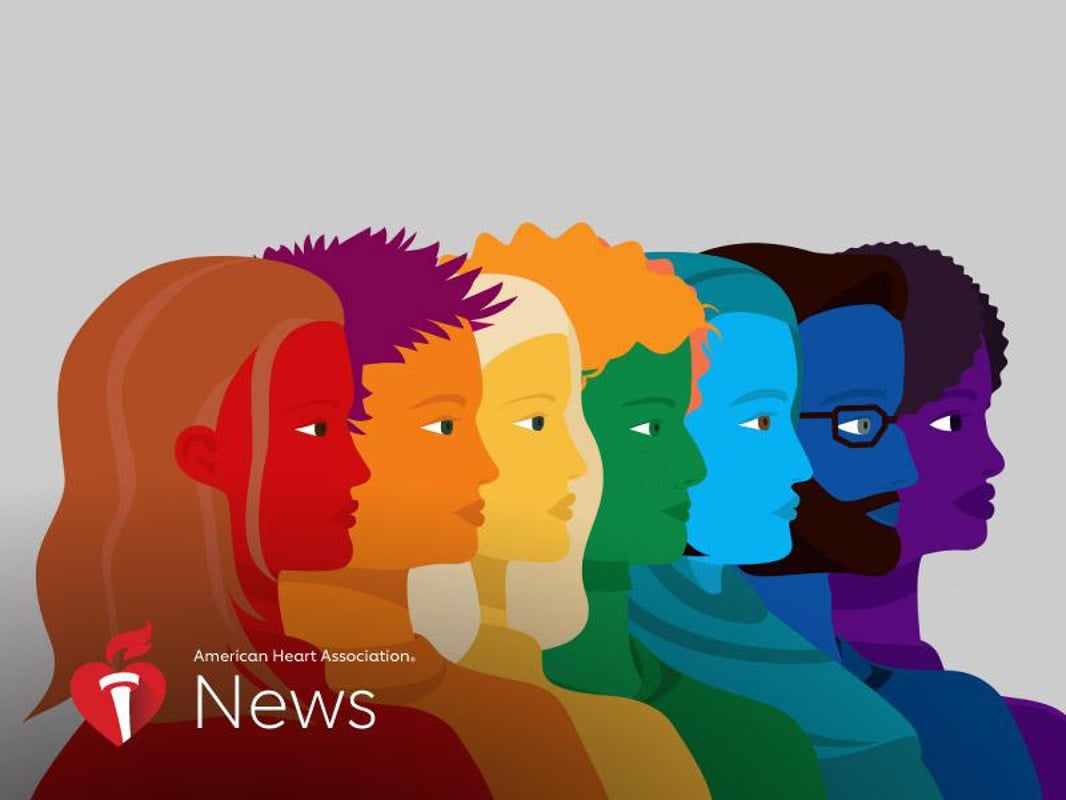AHA News: Why the World of LGBTQ Health Doesn’t Fit Under a Single Label

TUESDAY, June 14, 2022 (American Heart Association News) -- LGBTQ people may celebrate as one during Pride Month. But when the topic is health, experts say it's crucial to acknowledge differences.
Too often, LGBTQ people are considered one entity, "as if they all have the same issues, all have the same needs," said Dr. Carl Streed Jr., assistant professor of medicine at Boston University School of Medicine. "But that is not at all the case."
The latest Gallup poll combined with census data puts the number of LGBTQ adults living in the U.S. at around 18 million, Streed said. So it might be obvious that broad labels would not apply to all. But Streed, who also is the research lead for the Center for Transgender Medicine and Surgery at Boston Medical Center, said that not only is each letter of the LGBTQ label its own community with its own health needs, "there are unique needs within each individual letter of that as well."
"So it's not just that trans people have different needs than lesbians – there are different needs even within the trans communities," he said.
Some health issues do affect everyone under the LGBTQ umbrella, said Tonia Poteat, associate professor of social medicine at the University of North Carolina at Chapel Hill. Many of those issues relate to chronic stress in the face of discrimination.
"We see that in terms of both mental health, like higher prevalence of depression and anxiety, but also in terms of physical health," she said.
According to the U.S. Office of Disease Prevention and Health Promotion, discrimination against LGBTQ people has been associated with high rates of psychiatric conditions, substance abuse and suicide. And a 2020 scientific statement from the American Heart Association, which Poteat and Streed helped write, said "there is growing evidence that LGBTQ adults experience worse cardiovascular health relative to their cisgender heterosexual peers."
But as the focus narrows, differences emerge, Streed said.
"There are differences in rates of hypertension, levels of cholesterol and diabetes across all these categories," he said, as well as differences in levels of physical activity.
The example of hypertension, or high blood pressure, shows just how much a problem can vary among groups. Preliminary research presented last year at the AHA's Scientific Sessions conference found that while gay men and bisexual women both were at higher risk for high blood pressure than their heterosexual peers, the problem was more common in gay men. Lesbian women and bisexual men, meanwhile, faced no additional risks beyond what their heterosexual peers had.
Writing in the Lancet in 2021, Poteat and her co-authors said statistics from Canada indicate that bisexual women experience poorer mental health than lesbians.
The 2020 AHA scientific statement highlighted that lesbian women are more likely to use tobacco than heterosexual women, men and gay men, while transgender women and gay men bear a disproportionate burden of HIV, which is associated with increased risk for heart disease, when compared with non-LGBTQ people.
But research that highlights such differences is sparse. And that can lead to lack of understanding among physicians and ill-informed care, Streed said.
Health care professionals who aren't aware of LGBTQ needs can be insensitive about even basic medical needs. A lesbian woman might be asked about birth control, Streed said, or a transgender person might be told to get an exam on anatomy they don't have.
To Poteat, solutions could begin with a simple acknowledgment. "Everybody needs to be addressed as an individual," she said. "And that requires being curious about that person's individual experience, and also not coming with assumptions about who they are."
Streed agreed. Too often, he said, a visit to the doctor's office is filled with experiences that can alienate people who are not straight, healthy white men. Ill-informed care providers make "assumptions about what we think people should look like, what bodies they should have, and what families they should be part of."
To address that, care providers and researchers need to "unlearn a lot of assumptions and recognize the complexity of the actual diversity of human life and build research tools to recognize that and measure that," he said.
Poteat said people have the option to choose their care providers. She recommended GLMA.org, the website of a national association of LGBTQ health care professionals, which offers a free list of providers who testify to being LGBTQ friendly and knowledgeable. Trans people can look for providers who are certified by the World Professional Association for Transgender Health.
"Going through those organizations is one way to find people who are at least working on and trying to be LGBTQ aware and responsive," Poteat said.
People should feel comfortable and empowered to demand appropriate care, Streed said. "This is their health, and they're seeking help from a profession that's job is to care. So if our profession falls short, it is our fault."
American Heart Association News covers heart and brain health. Not all views expressed in this story reflect the official position of the American Heart Association. Copyright is owned or held by the American Heart Association, Inc., and all rights are reserved. If you have questions or comments about this story, please email editor@heart.org.
By Michael Merschel, American Heart Association News
Related Posts
Missed Cancer Screenings During Pandemic Could Raise Death Rate for Years
MONDAY, March 21, 2022 (HealthDay News) -- The early months of the COVID-19...
EU Eases COVID-19 Travel Rules Within the Bloc for Fully Vaccinated
TUESDAY, Jan. 25, 2022 (HealthDay News) -- European Union residents should be...
Medicare proveerá pruebas rápidas de COVID-19 gratuitas
VIERNES, 4 de enero de 2022 (HealthDay News) -- Medicare pronto proveerá hasta...
High Air Pollution Days Tied to Excess Hospitalizations
FRIDAY, March 17, 2023 (HealthDay News) -- Greater hospital admission risks for...
